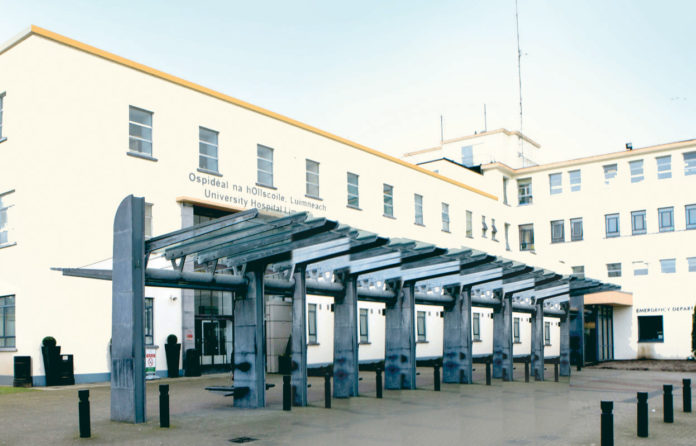
THE postponement of almost all elective surgeries and outpatient appointments across all six sites of UL Hospitals Group is to be extended until further notice.
The visiting ban at University Hospital Limerick, University Maternity Hospital Limerick, and Ennis, Nenagh, St John’s and Croom Hospitals remains in place until March 29th.
We sincerely regret having to extend this reduction in service, and we are sorry for any inconvenience or distress it has caused for affected patients, who will be rescheduled at the earliest opportunity.
Time-critical procedures, including cancer surgery, will continue in the coming days and weeks. Five theatres are currently open at UHL for emergency and trauma cases as well as time-critical elective surgery.
There are a number of exceptions and the following appointments and procedures continue as normal:
- – Dialysis (UHL)
- – Cancer services (oncology and haematology day ward; haematology and oncology OPD clinics; medical oncology clinics; Ward 4B appointments) (UHL)
- – UrgentCardiology diagnostics – patients being contacted directly (UHL)
- – OPAT (antibiotic therapy) (UHL)
- – Fracture Clinic (UHL)
- – Paediatrics: oncology/radiology day case/paediatric diabetes service (UHL)
- – Ante-natal clinic; colposcopy clinic; diabetes in pregnancy clinic; elective c-sections and induction of labour (UMHL)
- – Warfarin Clinic (Ennis Hospital)
- – Elective surgery for paediatric patients (Croom Orthopaedic Hospital)
- – Radiology appointments (Nenagh Hospital)
- – Warfarin Clinic (St John’s Hospital)
For a limited number of other urgent outpatient appointments and procedures, patients will be called directly by staff to confirm the appointment. Patients should only attend for their appointment or procedure if contacted directly by the hospital.
The visiting ban across UL Hospitals Group remains in place until March 29th.
We regret that so many people have been unable to visit their loved ones in hospital, and we acknowledge the impact of loneliness and isolation on people in our care at this time, particularly elderly people.
We have drop-off & collection services available at our sites to help people get important personal items to and from their relatives in hospital. Security staff at University Hospital Limerick and reception staff at Croom, Nenagh, Ennis, and St John’s Hospitals will be happy to assist with queries about this service.
The ban on visitors also applies to patients attending the Emergency Department at University Hospital Limerick and the Injury Units in Ennis, Nenagh and St John’s Hospitals, and we are grateful to the public and our patients for their cooperation at this most difficult time.
Their continued support has helped us to keep the Emergency Department as a place where we must prioritise the treatment of the most seriously injured and ill people, and those whose lives may be at risk.
The only exceptions to the visitor ban are as follows (with a strict limit of one visitor per patient):
- Partners of women attending University Maternity Hospital Limerick
- Parents visiting children in hospital
- People visiting patients at end-of-life
- People assisting confused patients (e.g. dementia)
- People visiting patients in Critical Care
As an alternative to attending ED we urge everyone to first consider the care options that are available in their own communities, including family doctors, out-of-hours GP services, and local pharmacies.
The Local Injury Units at Ennis and Nenagh Hospitals (8am-8pm daily), and St John’s Hospital (8am-6pm, Monday to Friday) are an excellent option for treatment of broken bones, dislocations, sprains, strains, wounds, scalds and minor burns, without a lengthy wait that can be expected in the ED at this time.
If you develop symptoms you will need to self-isolateand phone your GP. Do not go to a GP surgery, pharmacy or hospital. The GP will assess you over the phone. If they think you need to be tested for coronavirus, they will arrange a test.
UL Hospitals Group CEO, Colette Cowan, concluded: “We sincerely regret having to reduce services and restrict visiting across our sites. However, patient safety is our highest priority and as part of a number of actions in that regard, it is necessary to reduce activity and prioritise services for our sickest patients. We look forward to resuming normal service at the earliest appropriate opportunity”
“We ask that members of the public help in the national effort to slow the spread of COVID-19 by observing the visitor ban in our hospitals, by attending the Emergency Department at UHL only when necessary; by following relevant public health advice around hand hygiene, cough and sneeze etiquette and social distancing; and taking simple precautions to protect themselves, their loved ones and our community at large.”
Notes:
COVID-19 is spread through close contact with an infected person’s body fluids (for example, droplets from coughing or sneezing). It is also spread by touching surfaces that an infected person has coughed or sneezed on, which is one of the reasons why it is so important that people wash their hands regularly, practice respiratory etiquette, and try to avoid touching their face.
It can take up to 14 days for symptoms of Covid-19 (Coronavirus) to show.
Symptoms may include:
- a cough
- shortness of breath
- breathing difficulties
- fever (high temperature)
Covid-19 (Coronavirus) can also cause more severe illness, including:
- pneumonia
- shortness of breath
- breathing difficulties
- fever (high temperature)
Things you can do to protect yourself from getting Covid-19 (Coronavirus) include:
- wash your hand properly and regularly
- cover your mouth and nose with a tissue when you cough and sneeze
- Wash your hands properly and regularly with soap and water or an alcohol-based hand rub:
– after coughing and sneezing
– after toilet use
– before eating
– before and after preparing food
The general public is advised to follow advice from the HSEand the Health Protection Surveillance Centreto protect their health.
Any person concerned that they may have symptoms of COVID-19 (Coronavirus) should immediately isolate themselves from others and contact their GP by phone.
Need information and advice on COVID-19? Go towww.hse.ie/coronavirus








